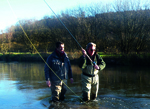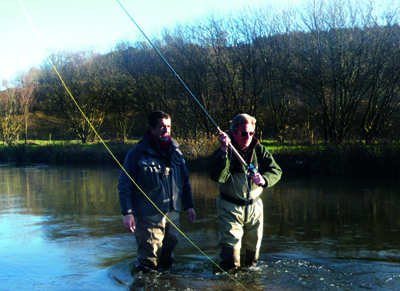How to fly fish
David Profumo gets some tips from a master caster as he goes back to basics with fly-fishing


You sometimes hear that it requires 10,000 hours of practice to become truly proficient with a stringed instrument, and I reckon that applies to the fly rod, too. This analogy isn't entirely fanciful.
I caught my first salmon on a spliced greenheart Vibration rod, designed by Alexander Grant, a violin-maker of some renown, who created his rod tapers with the assistance of a tuning fork. On the Ness, in 1895, using one of these 21ft stringed piscatorial instruments, he made a cast (without shooting line) of more than 65 yards -a distance record that stood for more than a century. My New Year's resolution is to improve my own casting. Over five decades, I've developed some deeply ingrained faults, and am always in need of a seasonal tune-up. Possibly, I've reached what psychologists call my ‘OK plateau', beyond which progress is unlikely; late luminaries such as Oglesby and Falkus gave me tuition, but I was never a star pupil. Certainly, I can cast after a fashion-but perhaps that fashion went out with Spangles and avocado bathroom units. The stylish Charles Ritz exercised his casting muscles by waving around an empty hock
The author tries to ‘let the rod do the work' under the watchful eye of Robin Elwes bottle. Falk squeezed squash balls. Robin Elwes limbers up with a crowbar. Since he joined Farlows back in 1988, he's been giving me refresher courses annually. A prodigious technician, he also knows the crucial difference between virtuoso demonstration and teaching proper. You could not ask for a more companionable mentor.
It's a chill wintry morning as we tackle up. Hardy's has loaned us a 15ft 1in doublehander from its outstanding Zenith Sintrix range (retailing at a penny short of a grand), and I wonder if it might improve my performance. ‘It's generally user error, not the tackle,' murmurs Robin diplomatically. ‘Now, would you please show me a nice, easy Roll Cast.' I flop out a couple of throws with the Rio shooting head. ‘And now that Double Spey you're worried about.' I make a tatty forward stroke, and my instructor's brow looks as knitted as an old Hebridean sock. ‘All right, then,' he sighs. Here we go again. Down the years, my mongrel style of salmon casting has acquired serious shortcomings -splashy D-loops, axe-murderer forward strokes and the polar opposite of that desirable ‘thistledown' delivery. I've been prescribed the remedies, but once I get fishing, I tend to develop ‘fin fever' and forget all advice.

* Country Life New Year Subscriptions sale
One boat partner described me as casting ‘like a gibbon', and an American guide thought I must hit a lot of baseballs. I persist in putting too much effort into the business, and Robin begins by telling me to relax my grip on the cork handle: ‘It's a common problem. Try to let the rod do the work. Smooth in, smooth out.' He's very patient.
When you learn to drive, at first, it's all about the controls, then comes the road sense. With fly-fishing, once the casting mechanics are no longer a source of anxiety, you can concentrate on stream craft and enjoy the whole process. Ideally, you should resist the fetish for distance and think positively about presentation. As Robin begins to unpick my bad habits, and make little serial adjustments, I find I am indeed enjoying myself. There's pleasure to be had from a well-executed cast, even if you catch nothing: this is a key element of angling. ‘That's good-lovely,' he says, as, at last, my timing improves and there's no aerial whip-crack.
Exquisite houses, the beauty of Nature, and how to get the most from your life, straight to your inbox.
By toning down my more exaggerated arm movements, he's already reintroduced rhythm to the experience-‘Keep that left hand tucked in. Don't overdo it. David: Hugh Falkus is dead!' I won't quite claim that pupil and instrument are in perfect harmony, but when the line does unfurl correctly, there seems to be a certain music to it. Perhaps it's the difference between poetry and mere verse, I don't know, but at last, it seems we're getting somewhere. I resolve to memorise all this for the coming season.
Around noon, the cold current has numbed my circulation and we wade to shore. At my request, Robin shows me some fancy modern casts such as the Snap-T and the Snake Roll, but I think I'll leave them for another day. A few grayling are rising, so I suggest we head upstream and commit some actual fishing. Mr Elwes beams assent: ‘It would be rude not to.'
* Follow Country Life Magazine on Twitter
For more information, contact Robin Elwes on 07973 639268
Country Life is unlike any other magazine: the only glossy weekly on the newsstand and the only magazine that has been guest-edited by His Majesty The King not once, but twice. It is a celebration of modern rural life and all its diverse joys and pleasures — that was first published in Queen Victoria's Diamond Jubilee year. Our eclectic mixture of witty and informative content — from the most up-to-date property news and commentary and a coveted glimpse inside some of the UK's best houses and gardens, to gardening, the arts and interior design, written by experts in their field — still cannot be found in print or online, anywhere else.
